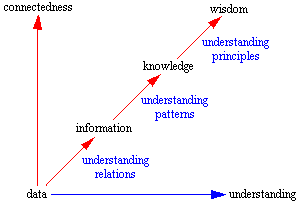Data, Information, Knowledge, and Wisdom by Gene Bellinger, Durval Castro, Anthony Mills
I have been interested in knowledge management for some time. One of the primary issues with knowledge management is being able to define exactly what knowledge is.
There is probably no segment of activity in the world attracting as much attention at present as that of knowledge management. Yet as I entered this arena of activity I quickly found there didn’t seem to be a wealth of sources that seemed to make sense in terms of defining what knowledge actually was and how was it differentiated from data, information, and wisdom.
According to Russell Ackoff, a systems theorist and professor of organizational change, the content of the human mind can be classified into five categories:
1. Data: symbols
2. Information: data that are processed to be useful; provides answers to “who”, “what”, “where”, and “when” questions
3. Knowledge: application of data and information; answers “how” questions
4. Understanding: appreciation of “why”
5. Wisdom: evaluated understanding
Gene Bellinger however contends that the sequence is a bit less involved than described by Ackoff. The following diagram represents the transitions from data, to information, to knowledge, and finally to wisdom, and it is understanding that support the transition from each stage to the next. Understanding is not a separate level of its own.

Data represents a fact or statement of event without relation to other things.
Ex: It is raining.
Information embodies the understanding of a relationship of some sort, possibly cause and effect.
Ex: The temperature dropped 15 degrees and then it started raining.
Knowledge represents a pattern that connects and generally provides a high level of predictability as to what is described or what will happen next.
Ex: If the humidity is very high and the temperature drops substantially the atmospheres is often unlikely to be able to hold the moisture so it rains.
Wisdom embodies more of an understanding of fundamental principles embodied within the knowledge that are essentially the basis for the knowledge being what it is. Wisdom is essentially systemic.
Ex: It rains because it rains. And this encompasses an understanding of all the interactions that happen between raining, evaporation, air currents, temperature gradients, changes, and raining.
While I agree with many of the principles above, I find I’m still developing my own dividing lines that separate knowledge from data, information, and wisdom.
Technorati Tags: Meandering Passage, Knowledge Management